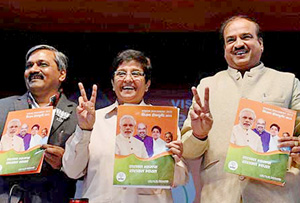New Delhi, Feb 3: The Congress Tuesday attacked the BJP for referring to northeast people as "immigrants" in its vision document, and asked if the party considers people from the region like those from other countries. The BJP, rushing to make amends, withdrew the word and stressed that the "brothers and sisters of the northeast are the pride of Delhi".
The Congress' campaign chief Ajay Maken, while releasing the party manifesto here, said: "Does the BJP consider the northeast people like those from other countries? Does the BJP want to say that the northeast is not part of the country?"
Maken said that at a time when External Affairs Minister Sushma Swaraj was visiting China, which lays claim to Arunachal Pradesh, was it proper for the Bharatiya Janata Party to come out with a vision document terming the northeast people "immigrants".
He said the Congress demands that the BJP rectify the error and apologise to the country.
"We will not tolerate that the BJP does this (refer to the northeast people as immigrants)," he said.
Noted journalist and BJP spokesperson M.J. Akbar, at a press conference Tuesday evening, said the party was withdrawing the word, and that it was "mistakenly used".
"The brothers and sisters of the northeast are the pride of Delhi. The word was mistakenly used. We withdraw the word, and we repeat that their (northeast people's) welfare is as important as that of any citizen of Delhi and the country," Akbar said.
BJP leader and Minister of State for Home Affairs Kiren Rijiju, who is from Arunachal Pradesh, when cornered by journalists, said the word was a "typo" and "clerical error".
The BJP's vision document for the Delhi elections has a statement that says "North eastern immigrants to be protected". Many people from the northeast have been attacked in the recent past in Delhi.





Comments
Add new comment